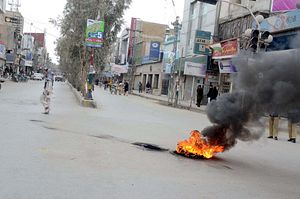The China-Pakistan Economic Corridor (CPEC) will be a “win-win” proposition according to statements made by the leadership of Pakistan and China. But the project is raising eyebrows and fears among the Baloch people, the indigenous community of Gwadar and the entire province of Balochistan. At the heart of the project is the city of Gwadar on the southwestern coast of the Arabian Sea in Balochistan province. Under CPEC, China and Pakistan plan to build a route to connect Gwadar Port in Pakistan with Kashgar in Xinjiang. The Chinese government has vowed to build the deepest seaport in the world in Gwadar, while creating infrastructure, energy and transportation projects along the route, reasoning that the resultant prosperity and economic development would change the shape of the most backward of Pakistan’s provinces specifically, as well as the whole of Pakistan.
So why would the Baloch people at large fear prosperity and progress? Wouldn’t the investment of $46 billion from China improve the living standards of the long-impoverished Baloch people? Why are most of the nationalists, intellectuals, students and ordinary people of Balochistan feeling suspicious? To answer that it is necessary to look back on the long history of Pakistan’s neglect of Balochistan in favor of the more populous provinces that are home to the large urban centers. While Balochistan may contain the richest mineral resources, its people receive little of the income derived from those resources and are deprived of the education, medical care, and concern for environmental protection afforded the most-favored provinces.
As the CPEC project moves forward, the fog of fear grows thicker. The native Baloch are of the view that, under the banner of economic development and prosperity, CPEC might turn them into a minority within their own land. As the influx of settlers begin to move into Gwadar and Balochistan as a whole, the natives are being ignored when it comes to jobs and other opportunities. The sense of deprivation and disappointment within the community is strong. Add to this the ongoing trend of issuing fictitious Balochistan domiciles to refugees (and others) and the list of Baloch grievances continues to mount.
As one Baloch student from Gwadar reminded me, Karachi was once a Baloch-dominant region. It was even named aftera Baloch woman, Mahi Kulachi. But in the name of development and urbanization, the authorities gradually transformed the Baloch majority of Karachi into a minority. Henow fears that it might be Gwadar’s turn, and that this time it might even entail all of Balochistan.
This fear is not limited to Baloch students. Baloch politicians and intellectuals are worried as well. Senator Mir Kabeer Ahmad Mohammad Shahi of the ruling National Party in Balochistan, and member of the Senate Special Committee on CPEC, has given much thought to the enormous demographic changes in the province that CPEC may bring about. He has demanded that the government enact legislation to protect the native people of the province from the anticipated influx of new arrivals there.
“We are not against the Gwadar deep seaport, CPEC or any other developmental project,” Kabeer said in an interview with The Nation (9 July 2015). “But if it is meant to marginalize the native people like Red Indians then we would not allow it to happen.”
The Chief of the Balochistan National Party (BNP) and former Chief Minister of Balochistan Sardar Akthar Mengal contests the CPEC project as not being acceptable without the consent of the local people. He has said that the project agreement was signed “without taking local people into confidence” and such a development project which violates the rights of the indigenous population cannot be endorsed.Even the federal government did not take the provincial government of Balochistan into confidence when entering into this agreement with China. Mengal says that he has read the CPEC agreements and that the project offers Balochistan nothing.
Chief Minister of Balochistan Dr. Abdul Malik Baloch has said that he was not taken into confidence by anyone with regard to the CPEC, and this revelation has further added to the sense of fear among the Baloch.
Baloch intellectuals for the most part hold the opinion that demographic changes from the CPEC project will be inevitable.The Baloch will become the minority unless the federal government enacts laws to protect their rights.
The locals would welcome infrastructural development and massive projects launched in Balochistan, but only if they really do benefit the locals. Indeed, they fear only more egregious inequities plotted under the cloak of the CPEC project.
The poverty in Balochistan has spurred the rise of nationalists who hold the federal government responsible for the backwardness of the province. They have been fighting since 1948 for the Baloch people’s right to ownership of the resources and coast of Balochistan, but their demands have been met with armed suppression. Now, with the federal government singing the praises of development, Balochistan must be assured that CPEC is destined to bring prosperity to the indigenous community as well, addressing its grievances and taking pragmatic steps to eliminate its fears. The alternative is chaos in an already troubled province, which could have disastrous repercussions for the project and the community itself.
Shah Meer is a Swedish Institute fellow. He graduated from NUML in International Relations and researches South Asian politics and Balochistan issues. He is originally from Pasni, District Gwadar, Balochistan, but is currently based in Islamabad.

































